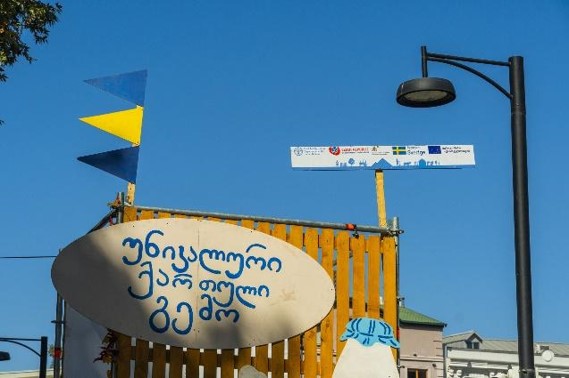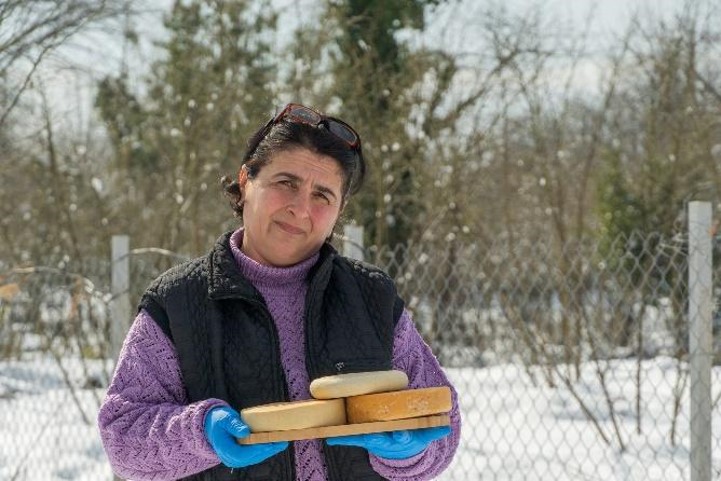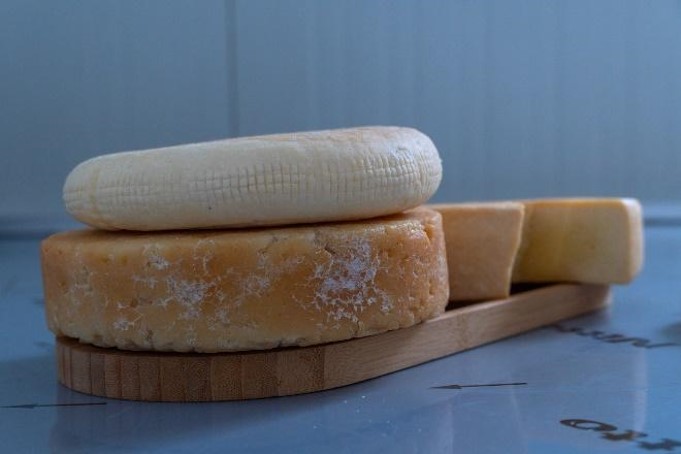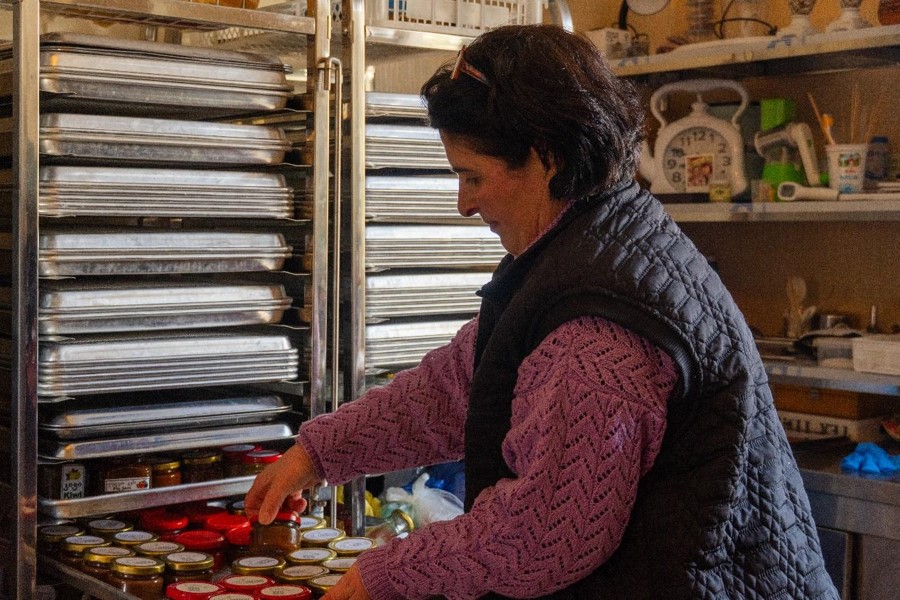
Hobby becomes a delicious business: bringing processed locally sourced fruits and vegetables to Georgia’s major cities
“During the first year when we had to relocate from Abkhazia because of the armed conflict, my mother brought dried fig and persimmon leather with her,” says Ekaterine Khutkubia, producer of niche and terroir goods now residing in Samegrelo. “We were sharing it with others in the back of the truck, transporting us away from home.”
More than 30 years have passed since that period, and inspired by her mother’s dried fruits, she is now making such niche products commercially in her home in Samegrelo-Zemo Svaneti.
“I first started making dried fruits and jams at the beginning of the 2000s,” Ekaterine says. “I used to have my relatives tasting them, and the emotional feedback I would get assured me that I was doing something right.”
In 2018, she decided that it was time to explore her potential as an entrepreneur and started attending business courses to find ways to transform her production skills into a commercial activity. “There is nothing unachievable, if you find the motivation within, you will be able to accomplish everything,” emphasises Ekaterine. With this philosophy in mind, she started learning, searching, and creating tirelessly.
In this process, in 2022, Ekaterine discovered that the Food and Agriculture Organization of the United Nations (FAO) was offering training about food safety, branding, and business management to the producers of niche and terroir products in Georgia. This knowledge-sharing opportunity was provided as part of the European Union-funded EU4Business initiative.


After attending the trainings, a select group of producers, including Ekaterine, had the chance to pioneer a series of Unique Georgian Taste agromarkets. These events are still being held in Georgia’s cities such as Tbilisi, Batumi, Mestia, and Kutaisi, through the support of the European Union (EU) and Sweden, under the fourth phase of the European Neighbourhood Programme for Agriculture and Rural Development (ENPARD IV). Bringing together more than 120 producers like Ekaterine from all of Georgia’s regions, the Unique Georgian Taste agromarkets have transformed into platforms that connect customers, businesses, and small and medium-scale producers of niche and terroir products.
The knowledge gained during the FAO trainings, and, most importantly, her creativity as well as fruit and vegetable processing skills, have helped Ekaterine stand out as one of the successful agromarket participants over the last three years. “The most important thing that the agromarkets have given me is that more consumers know my products – Georgians and foreign tourists – who purchase these products and share them with their relatives,” Ekaterine emphasises.
Since 2022, FAO, with the support of the EU and Sweden, has organised a total of 21 agromarkets, helping its participants generate more than GEL 500,000 during these public events, which are held in urban parks and squares. Ekaterine’s favourite Unique Georgian Taste event took place in 2023, during the Europe Day event in ExpoGeorgia, located in the capital city of Tbilisi, Georgia.


“I was exhibiting my dried fruits and vegetables, jams, and spices,” Ekaterine recalls fondly. “The traffic of people and engagement during that event was truly spectacular, but the agromarkets always stand out with a good flow of people interested in discovering, tasting and buying niche and terroir products.”
New inspiration, new opportunity
While participating in the Unique Georgian Taste agromarkets, Ekaterine noticed a group of dairy women producers with innovative cheese varieties she had never seen or tasted before. These women were Lead Farmers of the FAO Farmer Field Schools established in the Samegrelo-Zemo Svaneti region within the framework of the project funded by the Swiss Agency for Development and Cooperation and in partnership with UN Women.
“I would always go up to their stalls and taste the cheeses,” says Ekaterine. “Last year, one of the women farmers stated that a new Farmer Field School was being established near me and, since I have cattle myself, I thought I would also try to make the new cheese varieties myself.”
Hence, she expressed her interest in attending the new Farmer Field School. “I was soon informed that I was selected as a Lead Farmer,” Ekaterine says.


This time, supported by the EU and Sweden, under ENPARD IV, the FAO Farmer Field School, beyond producing innovative cheese varieties, focused on food safety in dairy production. “I found out that I knew very little about the safe production of milk,” Ekaterine points out. “I changed my milking routine to ensure food safety, and I started using various tools and methods for caring about animal health as taught by the FAO Veterinarians.”
“Most importantly, I was able to learn how the innovative cheese varieties are produced,“ she indicates. “I wanted to combine my dried fruit production skills with cheesemaking to create new tastes.”
As a result, along with her dried fruits, Ekaterine now also produces innovative cheese varieties. “My income has increased after introducing the cheeses and processed fruits and vegetables,” she indicates. “Everyone likes seeing such a combination on my stall at the agromarkets. They taste both the cheeses and processed fruits and vegetables and then buy them.”
“I want to have Georgian consumers taste more of my products,” says Ekaterine, when asked about the outlook for future developments. Proud of her accomplishments, she also wants to share knowledge with others.
For Ekaterine, her work is also connected to reducing food loss and waste, since by conserving fruits and vegetables through simple processing techniques, families, especially in rural areas, can preserve such products and ensure that their families have nutritious foods accessible throughout the year. This way, apart from popularising the production of niche goods, sharing her skills and experience of producing dried fruits and vegetables is a strategy for Ekaterine to play a role in achieving better production, better nutrition, better environment, and ultimately, a better life.

Within the framework of ENPARD IV, funded by the EU and Sweden, FAO continues supporting farmers with improving food safety, market access, while also sharing knowledge with them through Farmer Field Schools on the production of innovative cheese varieties. Ekaterine, as a Lead Farmer, as well as other food producers in Georgia, like her, are better positioned to expand the varieties of goods that they produce while following modern food safety standards.
About ENPARD
The European Union supports rural development in Georgia through its ENPARD Programme. Aiming to reduce rural poverty, ENPARD has been implemented since 2013. The Programme started by supporting the development of national agriculture potential. Subsequently, it also concentrated on creating economic opportunities for rural populations in Georgia. Since 2021, the Programme has also been working on improving food safety in the country, with additional support from Sweden and with FAO and the Czech Development Agency as the main implementers of this food safety component under ENPARD IV.
This article has been produced with the assistance of the European Union. Its contents are the sole responsibility of and do not necessarily reflect the views of the European Union.